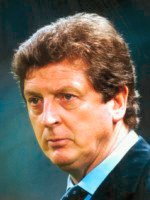| |
|
|
| |
 |
|
| |
Roy Hodgson |
|
When Fabio Capello was appointed England manager, it was said there were no suitable
English-born candidates who could do the job.
One possible choice whose name was barely mentioned was Roy Hodgson, one of Europe's
most respected coaches, who has now been given the task of saving Fulham from the
Premier League trap door.
The 60-year-old has taken charge of Fulham, a job that is likely to be his last
chance to prove to his homeland what the rest of Europe already knows.
Hodgson is considered one of the continent's most astute tactical thinkers, having
worked wonders with Switzerland and Finland as well as with Italian giants Inter
Milan.
He has huge respect in the corridors of Uefa and Fifa headquarters thanks to spells
on various technical study groups.
But Hodgson's legacy in England is slightly less emphatic, which could go some way
to explaining why the challenge at Craven Cottage proved too difficult to resist.
The Cottagers
are precariously placed in 18th place in the Premier League, having
won just two games all season.
The club said that relegation would not be tolerated when they sacked Lawrie Sanchez,
so Hodgson faces one of the stiffest tests of his 31-year managerial career.
His short-term goal is simple - keep Fulham in the Premier League. He inherits a
squad low on confidence with minimal time to assess who stays and who goes before
the transfer window opens on 1 January.
Hodgson is more than likely to dip into his extensive contacts book to address long-standing
problems - namely a goalscorer and a commanding centre-back among others.
However
chairman Mohamed Al Fayed will expect Hodgson to be slightly more discerning
with his money than he was during his 17-month tenure at Blackburn should the London
club spend on reinforcements during the January transfer window.
Hodgson arrived at Ewood Park in June 1997 with a huge fanfare after snaring him
from Inter. All seemed to go to plan in his first year in charge, guiding the Lancashire
club to sixth place in the Premier League and securing a berth in the Uefa Cup.
However it was in his second season when things began to go horribly wrong, especially
in the transfer market where he made more than the odd faux pas liberally spending
the late Jack Walker's profound coffers.
He spent £7.5m on Kevin Davies, a then promising 20-year-old striker who had scored
nine goals in 25 games for Southampton.
He then paid up an astonishing £5.3m for Derby's Scotland international Christian
Dailly, an honest defender who was probably just as staggered as the Rams's board when they discovered the value of his transfer fee.
Rovers began the 1997/8 season badly as Davies failed to find the back of the net
and Dailly struggled to make an impression. The club found themselves at the bottom
of the league with just nine points from 14 games and inevitably Hodgson received his marching orders.
Since the nadir at Blackburn, Hodgson has rebuilt his reputation with various clubs
across Europe including a second spell at Inter, FC Copenhagen, Udinese and latterly
with Finland, whom he took to the brink of qualification for Euro 2008 for the first
time in their history.
So the next stage of his illustrious career moves to south-west London and a club
in dire need of a quick fix.
But more importantly for Hodgson, it will probably be his last opportunity to prove
to his native country just how good a coach he really is.